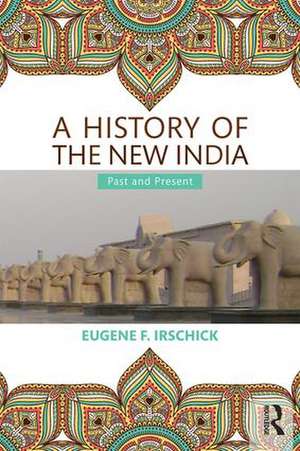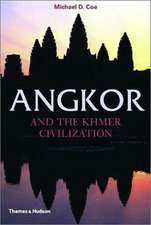A History of the New India: Past and Present
Autor Eugene F. Irschicken Limba Engleză Paperback – 20 iul 2015
- Mughal warfare and military developments
- The construction of Indian culture
- Indian, regional and local political articulation
- India’s Independence and the end of British Rule
- Women and governmentality
- The rise of the Dalit movement
| Toate formatele și edițiile | Preț | Express |
|---|---|---|
| Paperback (1) | 482.60 lei 6-8 săpt. | |
| Taylor & Francis – 20 iul 2015 | 482.60 lei 6-8 săpt. | |
| Hardback (1) | 1109.99 lei 6-8 săpt. | |
| Taylor & Francis – 8 iul 2015 | 1109.99 lei 6-8 săpt. |
Preț: 482.60 lei
Nou
Puncte Express: 724
Preț estimativ în valută:
92.34€ • 96.41$ • 76.43£
92.34€ • 96.41$ • 76.43£
Carte tipărită la comandă
Livrare economică 05-19 aprilie
Preluare comenzi: 021 569.72.76
Specificații
ISBN-13: 9780415435796
ISBN-10: 041543579X
Pagini: 210
Ilustrații: 5 tables, 5 halftones and 5 line drawings
Dimensiuni: 156 x 234 x 13 mm
Greutate: 0.3 kg
Ediția:1
Editura: Taylor & Francis
Colecția Routledge
Locul publicării:Oxford, United Kingdom
ISBN-10: 041543579X
Pagini: 210
Ilustrații: 5 tables, 5 halftones and 5 line drawings
Dimensiuni: 156 x 234 x 13 mm
Greutate: 0.3 kg
Ediția:1
Editura: Taylor & Francis
Colecția Routledge
Locul publicării:Oxford, United Kingdom
Cuprins
Introduction 1. Mughal Devolution and the Deccan 2. Mughal Devolution in Bengal and South India 3. The Path to Company Sovereignty in India, 1756-1801 4. Creating a Ruling Strategy, 1770-1830 5. Reform and Rebellion: Resistance to Becoming a Subject 6. Moral Reform and Self-Discipline7. New Identities, New Demands 8. Conclusion
Notă biografică
Eugene F. Irschick was Professor of History at University of California, Berkeley, USA. In his research and published works, such as Dialogue and History: Constructing South India, 1795-1895 (1994), he suggests that the production of history and political structures is dialogic. He has been teaching courses on Indian history at UC Berkeley for 46 years. Much of the time during his early teaching years was focused on minority and separatist politics in south India during the 20th century. Recently, he has been teaching courses on women’s history in South Asia as well as courses on post-colonialism.
Recenzii
"Eugene F. Irschick's A History of the New India is a convincing and theoretically nuanced account of certain critical moments in the everyday living of Indians. Irschick sheds light on a variety of topics and presents a thoroughly novel take on how colonized Indian women and men from different castes and classes actually self-fashioned, modified, learned to govern themselves, and realized their subjectivity. A must read..." Shailaja Paik, University of Cincinnati, USA
"In this accessible textbook, Irschick has incorporated Mughal India as Early Modern India instead of focusing solely on colonial and post-colonial India. With his own extensive research, he has been diligent in providing examples from both north and south India, and includes examples from areas such as Punjab and Kerala that many overview histories frequently ignore." Barbara Ramusack, University of Cincinnati, USA
"In this accessible textbook, Irschick has incorporated Mughal India as Early Modern India instead of focusing solely on colonial and post-colonial India. With his own extensive research, he has been diligent in providing examples from both north and south India, and includes examples from areas such as Punjab and Kerala that many overview histories frequently ignore." Barbara Ramusack, University of Cincinnati, USA
Descriere
Providing a different approach to the history of India than previously advocated, this textbook argues that there was constant interaction between peoples and cultures. This interactive, dialogic approach provides a clear understanding of how power and social relations operated in South Asia.
















